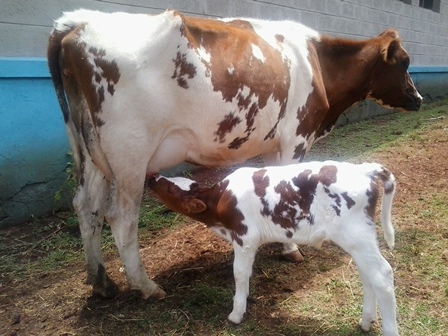A former regional agricultural extension officer is milking at least Sh54,000 per month from well performing and better adopted crossbreed from two superior dairy cattle.
Daudi Orina says upgrading an ayrshire with a friesian gave him strong characteristics for better results at low maintenance costs.
Pure breeds have varied vulnerability to diseases and pests, weather, as well as feeding, among others.
But at the same time, their quality and quantity of produce vary incredibly, therefore, the need to ‘mix the genes’ for average results.
“Mixing blood of the two gives a crossbreed, which has average characteristics. An ayrshire, which has less milk is uplifted by the Friesian which produces more. The thicker milk from ayshire milk will also increase the concentration of the lean Friesian produce,” he says.
Orina, who majorly relies on green fresh feeds, harvests at least 40 litres (40 kilogrammes) of milk every day from his two cross-bred cows. More milk is produced on the immediate months after calving down. One litre fetches Sh45. This translates to Sh54,000 per month.
He has no done complete zero grazing. He allows the animals to graze in the paddocks.
Baptising milk
His morning milk is taken to Nyamira town, which is about 20 kilometres from his farm at Kenyenya.
“I used to keep the evening milk in my cooler to sell the following day. But the growing demand no longer allows me to do that anymore. Customers come in droves. Am forced to ration for each to get something,” he says.
In spite of more farmers yielding more milk around his home, Orina says, ‘baptising’ the produce with water to increase the quantity for the thirsty market reduces quality.
Consumers prefer his milk because of it is not adulterated.
He mainly feeds his cattle on Napier grass from his two-acre plantation and other green matter. About 20 kilogrammes of dry matter or 40 kilogrammes of green feed is sufficient for every cow. Each of the two cattle gets about three kilogrammes of commercial feeds supplements daily.
Pure breeds would require twice or more of this amount of feeds per day.
In his farming, the farmer says, he has been using artificial insemination for more than five years. But the service is not as effective as before.
READ ALSO: Hormonal lift and feeds cure cow 'infertility'
The former head of Agricultural Farmers Cooperation Western Region head says he does multiple AIs for successful fertilisation.
At the same time, cows are taking more than 60 days to be on heat, a factor that is becoming economically non-viable because of low produce.

















Comments powered by CComment